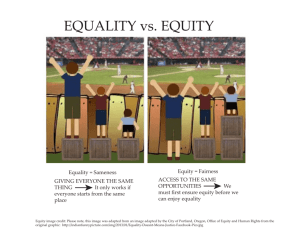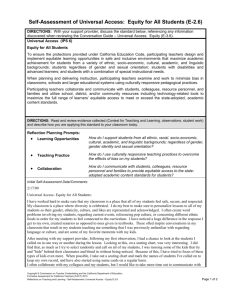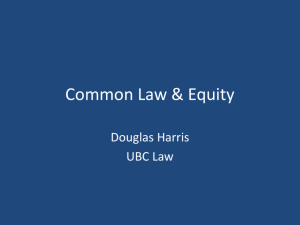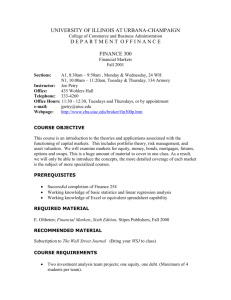Real Property - University of Sydney
advertisement
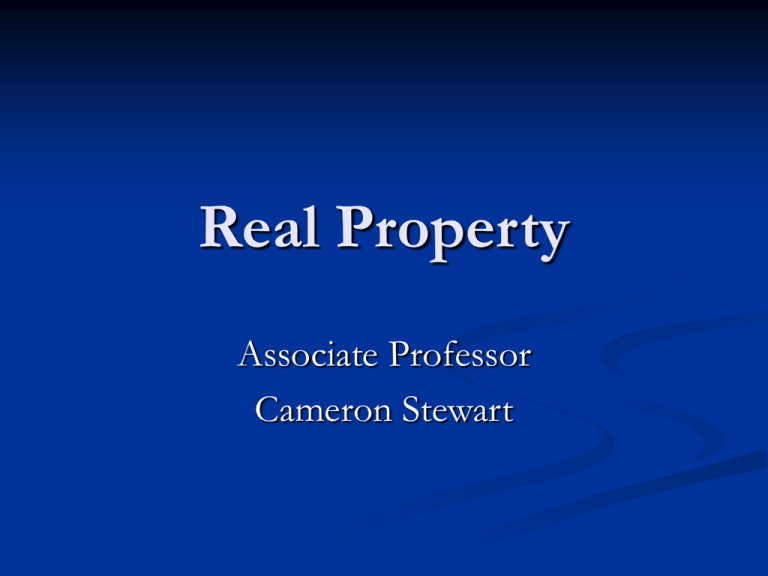
Real Property Associate Professor Cameron Stewart The Blind Men and the Elephant John Godfrey Saxe What is property? Real & Personal Real Property – realty, interests in land – land is three dimensional space located by reference to a point on the earth’s surface – fixtures – in the past only land was recoverable Real Property is also split into two categories – corporeal and incorporeal hereditaments (a right capable of being devised to an heir) What is property? Real & Personal Personal Property – catchall (a) Chattels real – leasehold and other interests in land that are less than freehold – distinction drawn because of an institutional definition of rights – only freeholds were enforceable by real actions for recovery (b) Chose in possession – a movable corporeal thing – eg goods What is property? Real & Personal Sale of Goods Act 1923 s 3(1) "chattels personal other than money and things in action and also includes emblements and things attached to and forming part of the land which are agreed to be severed before sale or under the contract for sale" Bankruptcy Act 1966 s 5(1) – ships aircraft and other vehicles; animals including fish; minerals, trees and crops, whether on or attached to the land or not and gas and electricity What is property? (c) Chose in action – a movable incorporeal thing rights which are enforceable by action – eg shares, patents copyrights, equitable securities, contractual rights, promissory notes, cheques, mere equities Test: (i) Enforceability (ii) Incorporeal and intangible (iii) Bare right – not occupation and enjoyment What are the characteristics of "property"? Possession Physical control - corporeality - what about all the incorporeal forms of rights which are also property? Exclusion The right to stop others from enjoyment of the thing Backburn J in Milirrpum v Nabalco What are the characteristics of "property"? Enjoyment and use Property rights are also use rights - but there may also be rights to enjoy which are not "property" - rights to use public space - do you have a right to enter a national park - generally yes, but you do not "own" that right Some rights of enjoyment can be transferred into property - fishing and hunting rights can fructify into property (eg when the animals and fish are killed or captured they become property) What are the characteristics of "property"? Other enjoyments rights might have some proprietary characteristics - eg a business telephone number: Rahne v Telstra Corporation (unreported, Young J, 8 June 1995) What are the characteristics of "property"? Definable and Identifiable You have to be able to recognise it for you to enjoy the rights of protection and use But property on the fringe is becoming vague colors (Eagle Boys pizza), sounds (Harley Davidson) What are the characteristics of "property"? Durable Does property have to last? In general it would be hard to say that something which disappeared or was destroyed after a short time could be owned or enjoyed as property - but durability is a poor indicator of property given the explosion in the number and types of choses in action these have no physicality and hence don't exist in the real world at all What are the characteristics of "property"? Transferable/assignable; Alienation - If a thing can be sold then it is most likely to be considered as property Is it merely personal to the right holder or can the right holder trnafer the right to another? King v David Allen & Sons Gordon Laidler and Associates Pty Ltd v Hocking Young J 6 march 1995 – fishing licence What are the characteristics of "property"? Dominion – right against the world (in rem) Blackstone - what restrictions exist for property owners today? Public interest – benefits v detriments of recognizing property rights There will be some property interests that will not be recognised because of the public interest Some historical examples: The quasi proprietary nature of familial services What are the characteristics of "property"? Slavery - the common law was uncomfortable with the slave as property because of the traditions of habeus corpus - but it had no problem with recognising slavery in the colonies - Sommerset's case 1772 - 1807 Modern example - human organs and corpses Burial rights, the definition of death and the invention and perfection of transplantation Moore's case R v Kelly What are the characteristics of "property"? Social relationship Expression of the social relationship in the common law - Materialism in the common law!! – conceptualizing relationships as things in themselves Interest defined The conventional term for the bundle of rights which a person has in an object. Eg interests in land (covenants, easements, caveats, contract for sale) v ownership of land Ownership defined Knapp v Knapp [1944] SASR 257 at 261 per Mayo J: "The general right of ownership embraces subsidiary rights such as exclusive enjoyment, to destroy, to alienate or to alter, and, of course, the right to maintain, and to resume and recover possession from other persons" Ownership defined Ownership indicates the relationship between a person and a corporeal or incorporeal legal object. It confers a bundle of rights to enjoy, use possess, dispose of and alienate a "thing" as well as the capacity to ward of any encroachment on the thing. Ownership can be limited by other rights but is not dependent on other rights. Ownership is therefore the subsidiary right that is left when all other interests in the property have been taken away (Campbells Hardware & Timber Pty Limited v CSD (Qld) (1996) 96 ATC 4348) Title defined Title is the measure of the strength of an interest. It provides a yardstick to measure the strength of competing claims of interests in property Possession defined No complete, logical and exhaustive definition of "possession" has ever been given for the common law – United States of America & Republic of France v Dollfus Mieg et Cie SA & Bank of England [1952] AC 582 at 605 "Possession connotes a relationship between a person and some material object. It is a relation subsisting in fact. The ‘right’ of the possessor to the chattel arises out of the factual situation" – Button v Cooper [1947] SASR 286 at 292 Possession defined Two elements are necessary – (1) control (corpus possessonis) – some exercise of power over the goods or land (2) intention (animus possidendi) – an attitude in the mind of the actor denying the rights of other to have access to the land or goods Possesory Title Possession confers a possessory title – possession is a root of title – possession is not only evidence of title but is a form of title itself – hence you have a claim against the whole world barring the true owner – title is relative The concept of land Common understanding is a solid piece of the earth’s surface – however legal meaning is more abstract Land – a three dimensional area of space the position of which is located by reference to real of imaginary points on the earth’s surface The area can be on the surface of the earth or above or below it – it does not have to contain any matter ("airspace") but usually is considered to do so – if the matter contained in the space is destroyed then the land will still exist The Anglo-Saxon Invasions c500AD Features of Anglo-Saxon Law Shire Moots and Hundred Moots Compurgation – wager of law Ordeal – fire, water, corsnaed Distress Outlawry Bots (compensation for injury), wer (compensation for death) Deodand Manorial justice Property is allodial The Partial Unification of the Kingdoms Pre-Norman Geography The Battle of Hastings 1066 Norman Reorganisation Sovereignty Absolute beneficial title Reception of laws Conquering Settling; Cessession Feudalism The hierarchy of property Homage fealty Subinfeudation Lords and villeins – unfree servitude (labour) Growth of manorial customary law – enforceable in the manor courts – unfree tenure - copyhold Kings courts and seisin Types of tenures Knight service - military Serjeanty – personal services to the King – onerous to the comical Frankolmoin – religious Socage - residual – rose, hangings, ploughing, money rents Incidents – Homage and fealty, primer seisin - king's right to take land until homage paid relief - right to claim amount when heir took tenancy aids - levyies for particular occasions eg ransom wardships - when heir took inheritance before majority lord would take wardship and be able to claim fees for administering estate- control marriage - traffic escheat - right of feudal overlord to take back estate if tenant was convicted of serious offence, fled jurisdiction or died without heirs Henry II – the Father of the Common law Curia Regis General Eyre and Assizes Assize of Clarendon 1166 – 12 freemen from the hundred and 4 from the town Henry, Richard Coeur-deLion and John Lackland John Lackland and Magna Carta Loss of France Quarrel with Pope Innocent III 1213 Langton and the Charter of Liberties 1215- Runnymede John Lackland and Magna Carta 63 Clauses 39: No freeman shall be taken or imprisoned or dispossessed or outlawed or exiled or in any way destroyed …unless by the lawful judgment of his peers, or by the law of the land Edward Longshanks Hammer of the Scots Parliament begins 1275 The use of statute as opposed to ordinance Nisi Prius Quia Emptores Curia Regis – embryonic courts Court of Exchequer – revenue Court of Common Pleas – civil actions Court of King’s bench – crime Remaining Council functions split into King’s Council later Concilium Regis and then Privy Council The Writ System Bureacracy Organisation of wrongs Real actions, writs of right Remedies Popularity Recording Stare Decisis Errors and Appeals The Record of judgment Error’s on the record Appealing the error Appeal only available when there was an error of law The Modern Tudor State The War of the Roses and the weakening of the nobility Reformation The Collapse of Papal power in England Act of Supremacy Dissolution of Monasteries Prerogative Courts Court of Star Chamber: the Curia Regis as a court – court by 1487 Criminal and Civil jurisdiction – court of criminal equity Order offences – riots, juries, conspiracy – secret hearings Political trials under the Stewarts Abolished in 1681 Court of Requests – paupers’ equity Court of High Commission – eccelesiastical immorality What’s the common law meant to do? Persons & Property Quick, efficient, fair and effective Real property – real actions- real relief Seisin Remedies – return the seisin, pay monetary damages Contract and tort What’s the common law meant to do? The requirement for writing - formality Statute of Frauds 23B Assurances of land to be by deed (1) No assurance of land shall be valid to pass an interest at law unless made by deed. What’s the common law meant to do? 23C Instruments required to be in writing (1) Subject to the provisions of this Act with respect to the creation of interests in land by parol: (a) no interest in land can be created or disposed of except by writing signed by the person creating or conveying the same, or by the person’s agent thereunto lawfully authorised in writing, or by will, or by operation of law, (b) a declaration of trust respecting any land or any interest therein must be manifested and proved by some writing signed by some person who is able to declare such trust or by the person’s will, (c) a disposition of an equitable interest or trust subsisting at the time of the disposition, must be in writing signed by the person disposing of the same or by the person’s will, or by the person’s agent thereunto lawfully authorised in writing. (2) This section does not affect the creation or operation of resulting, implied, or constructive trusts. What goes wrong? What happened to Tenure? Subinfeudation Quia Emptores 1290 - eliminate subinfeudation and allow assignment of land without consent 14th century - labour economies 16th century fixed money rents - Statute of Wills so escheat not a problem 17th century so small not worth worrying about - 1660 Tenures Abolition Act - all socage and no incidents, except forfeiture and escheat The Office of the Lord Chancellor Around since Norman times Keeper of the King’s Conscience Cleric and Keeper of the Great Seal Member of Lords, Judge and Church Chancery as a Court Around the 15th century Function to repair the failings of Common law Principles of Christian fairness/conscience Maxims of equity Substance not form Does not assist a volunteer Equity follows the law Clean hands Discretion and the Chancellor’s foot The two streams – law and equity Equity’s role ‘You must not allow conscience to prevent your doing justice’. Problems with the Common law The Lord Chancellor and the popularity of equity Earl of Oxford’s Case (1615) 1 Ch Rep 1; 21 ER 485. In that case, at Ch Rep 6-7, 10; ER 486-7, Lord Ellesmere said: The Office of the Chancellor is to correct Men’s consciences for Frauds, Breach of Trusts, Wrongs and oppressions, of what Nature soever they be, and to soften and mollify the Extremity of the Law ... [W]hen a Judgment is obtained by Oppression, Wrong and a hard Conscience, the Chancellor will frustrate and set it aside, not for any error or Defect in the Judgment, but for the hard Conscience of the Party. Equity’s role Parkinson: (i) the exploitation of vulnerability or weakness, as exemplified in principles relating to unconscionable dealing and undue influence; (ii) the abuse of positions of trust or confidence, as exemplified in the law of trusts and fiduciary obligations generally; (iii) the insistence upon rights in circumstances which make such insistence harsh or oppressive as exemplified in relief from penalties and forfeiture, the law of equitable set-off, and the refusal of specific performance on the discretionary ground of hardship; Equity’s role Parkinson: (iv) the inequitable denial of obligations, as exemplified in the doctrine of part performance and the principle of equitable estoppel; (v) the unjust retention of property, as exemplified in certain constructive trusts and principles of subrogation. The Stewart Disaster James VI of Scotland The rise of protestantism Absolutism of sovereign – Divine Right of Kings or King-in-parliament? The Stewart Disaster James and Edward Coke Artificial reason of the common law Bacon & Ellesmere: Earl of Oxford’s case Bacon & Coke Dr Bonham’s case Chancer’s case Earl of Oxford’s case The Office of the Chancellor is to correct Men’s consciences for Frauds, Breach of Trusts, Wrongs and oppressions, of what Nature soever they be, and to soften and mollify the Extremity of the Law ... [W]hen a Judgment is obtained by Oppression, Wrong and a hard Conscience, the Chancellor will frustrate and set it aside, not for any error or Defect in the Judgment, but for the hard Conscience of the Party. The Stewart Disaster The Long parliament Habeas corpus The Civil War Regicide of Charles I Extreme Puritanism Levellers Restoration and revolution Interregnum Restoration of Charles II Tolerance of Catholics James II – Catholic and married to a Catholic – Abdication – William and Mary 1689 – Bill of Rights, Act of Settlement The Action of Ejectment The failure of the common law writs The new action for ejectment Legal Fictions in land law: Doe and Roe The legalisation of equity The Civil War – equity nearly destroyed Lord Nottingham (1673-82)– father of equity Lord Eldon – (1801-27) modern rules Precedent and fixation Appointment of VC Poor administration Infamous delay – record 16 years and still interlocutory th 19 Century reforms Bentham and the ‘dog law’ Judicature Acts 1870s – 1970s The two streams in one courtWindeyer J in Felton v Mulligan (1971) 124 CLR 367 at 392; [1972] ALR 33 at 46 Fusion fallacies Salt v Cooper (1880) 16 ChD 545 at 549, Jessel MR said of the effect of the Act: It has been sometimes inaccurately called 'the fusion of Law and Equity'; but it was not any fusion, or anything of that kind; it was the vesting in one tribunal the administration of Law and Equity in every cause, action, or dispute which should come before that tribunal. … To carry that out, the Legislature did not create a new jurisdiction, but simply transferred the old jurisdictions of the Courts of Law and Equity to the new tribunal, and then gave directions to the new tribunal as to the mode in which it should administer the combined jurisdictions. Property in CL Universalized, reified, fetishized – the materialization of the common law Formality Creation Transfer Rights recognised in contract and tort – breach of contract, trespass, negligence Remedies for breach of property rights – damages CL makes orders about the property not the people Property in Eq Substance Conscience Power Responsibility – lunacy, infants, married woman Trust and confidence BUT through the logic of precedent not unfettered discretion Rights recognised through doctrines of equity – misrepresentation, undue influence, duress, unconscionability, fiduciary relationships, part performance, equitable estoppel, breach of confidence Remedies – injunctions, specific performance, constructive trusts, personal orders Equity makes orders about the people not the property Property in Eq Equitable property or interest (equitable fee simple, mortgages, covenants etc) Personal Equities (Gill v Gill) Mere Equities (Latec) Case study 1: When contracts go bad A (vendor) exchanges contracts with B (purchaser) A gets a better offer from C (he knows about B’s offer) and completes the sale to C before B knows Common law approach? Breach and damages – no property held by B Equitable approach: breach and specific performance But what about the property interests? Case study 1: When contracts go bad In common law B is not the owner as the contract has not been completed so the property cannot be returned In equity, the rule in Lysaght v Edwards says that B gets an equitable interest from the exchange and that it is a form of constructive trust, which can be enforced against C (when he knows about B) Case Study 2: Fat Henry and the problem of trusts Henry and the purse strings Taxation in Tudor England – feudal tenures Primogeniture Devising land by will The legal remainder rules The use A --------------------------B --------------------C (Landowner) (feoffee to use ) (cestui que use) Legal estate Beneficial estate CL Equitable The Statute of Uses 1535 Collapse the use Springing uses The use on the use Equity creates property where there was none before…… Case study 2: Part performance and the equitable ‘impersonation’ A Lease for a factory – an agreement to create a deed Or a mortgage created by deposit of title deeds Or a promise to give a life interest if cared for in dotage… The requirements for writing 23B Assurances of land to be by deed (1) No assurance of land shall be valid to pass an interest at law unless made by deed. 23C Instruments required to be in writing (1) Subject to the provisions of this Act with respect to the creation of interests in land by parol: (a) no interest in land can be created or disposed of except by writing signed by the person creating or conveying the same, or by the person’s agent thereunto lawfully authorised in writing, or by will, or by operation of law, …. The requirements for writing 54A Contracts for sale etc of land to be in writing (1) No action or proceedings may be brought upon any contract for the sale or other disposition of land or any interest in land, unless the agreement upon which such action or proceedings is brought, or some memorandum or note thereof, is in writing, and signed by the party to be charged or by some other person thereunto lawfully authorised by the party to be charged… CL says no deal Part performance Equity looks to substance not form Was there an agreement? Did a party act under that agreement and performed an act to their detriment which relates solely to the agreement? Is the agreement one which a court of equity would order specific performance? If yes to all then equity creates an interest which is an equitable impersonation or copy of the common law interest being claimed Future adventures There are many ways to create and transfer property in law and equity Gifts Choses in Action and s 12 of the Conveyancing Act Section 23C of the Conveyancing Act Equitable assignment The Sluggards in Equity Precedent and control Lord Nottingham and precedent 1621 Lord Eldon 1751 Infamous delay – record 16 years and still interlocutory th 19 Century reforms Bentham and the ‘dog law’ Criminal Procedure Judicature Acts 1870s The two streams in one court Colonial Australia The status of the local laws of a colony depended upon whether it was: a conquered colony; or a settled colony (terra nullius- an empty land) Colonial Australia Australia was treated as being settled as it was considered to be unoccupied, that is, as terra nullius No recognition of Aboriginal laws or customs Aboriginal land rights not recognised


